In the competitive world of self-publishing, effective social media strategies are essential for increasing visibility and engaging with readers. By utilizing platforms like Instagram, Twitter, Facebook, and TikTok, authors can create targeted content that resonates with their audience, fostering growth and loyalty. Consistent engagement and valuable content sharing are key to building a strong online presence and cultivating a vibrant community around their work.
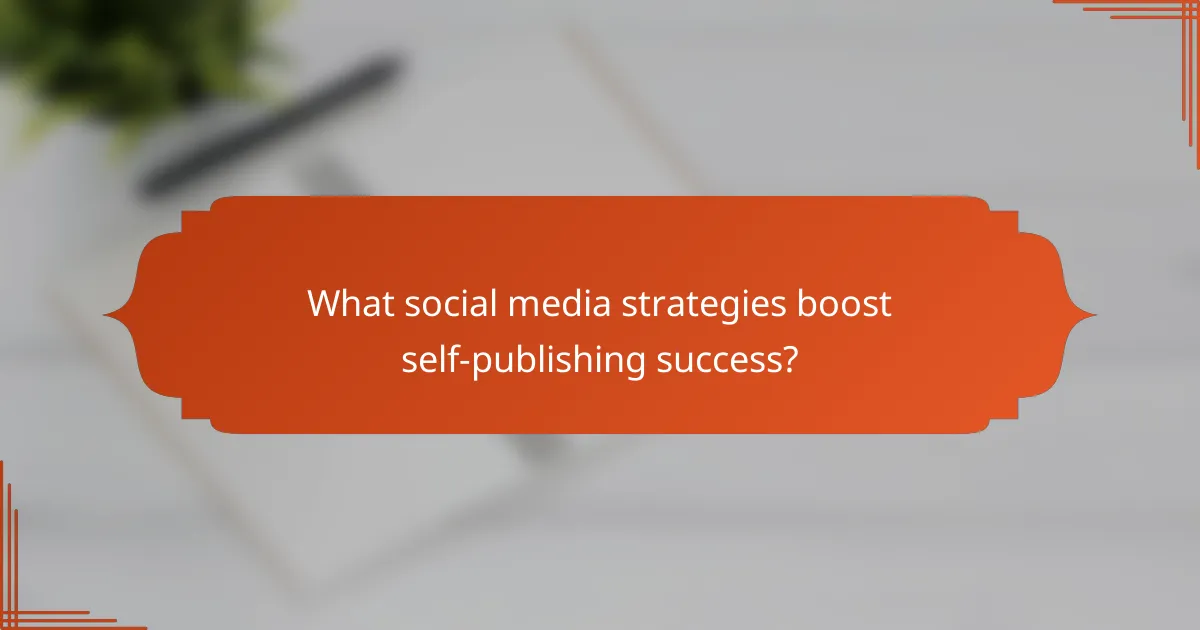
What social media strategies boost self-publishing success?
Effective social media strategies can significantly enhance self-publishing success by increasing visibility, engaging readers, and building a loyal audience. By leveraging platforms like Instagram, Twitter, Facebook, and TikTok, authors can create targeted content that resonates with potential readers.
Content marketing on Instagram
Instagram is a visual platform ideal for showcasing book covers, quotes, and behind-the-scenes content. Authors should focus on creating aesthetically pleasing posts that highlight their work while using relevant hashtags to reach a broader audience.
Utilizing Instagram Stories and Reels can further engage followers with dynamic content. Consider sharing short readings, book trailers, or interactive polls to encourage audience participation and feedback.
Engagement tactics on Twitter
Twitter is excellent for real-time engagement and building connections with readers and other authors. Use threads to share insights about your writing process or discuss themes in your books, encouraging conversations with your audience.
Participating in Twitter chats or using trending hashtags can increase visibility. Aim to tweet consistently, responding to comments and mentions to foster a sense of community and keep followers engaged.
Building a Facebook community
Creating a Facebook group dedicated to your readers can cultivate a strong community around your work. This space allows for direct interaction, where you can share exclusive content, host Q&A sessions, and gather feedback on your writing.
Regularly posting engaging content, such as polls, book recommendations, or writing tips, can keep group members active and invested. Encourage members to share their thoughts and experiences related to your books to enhance engagement.
Utilizing TikTok for book promotion
TikTok has rapidly become a powerful platform for book promotion, especially among younger audiences. Authors can create short, engaging videos that highlight their books through creative storytelling or unique concepts that resonate with trends.
Consider participating in popular challenges or using trending sounds to increase the chances of your content going viral. Authenticity is key; share personal stories or insights that connect with viewers on a deeper level.
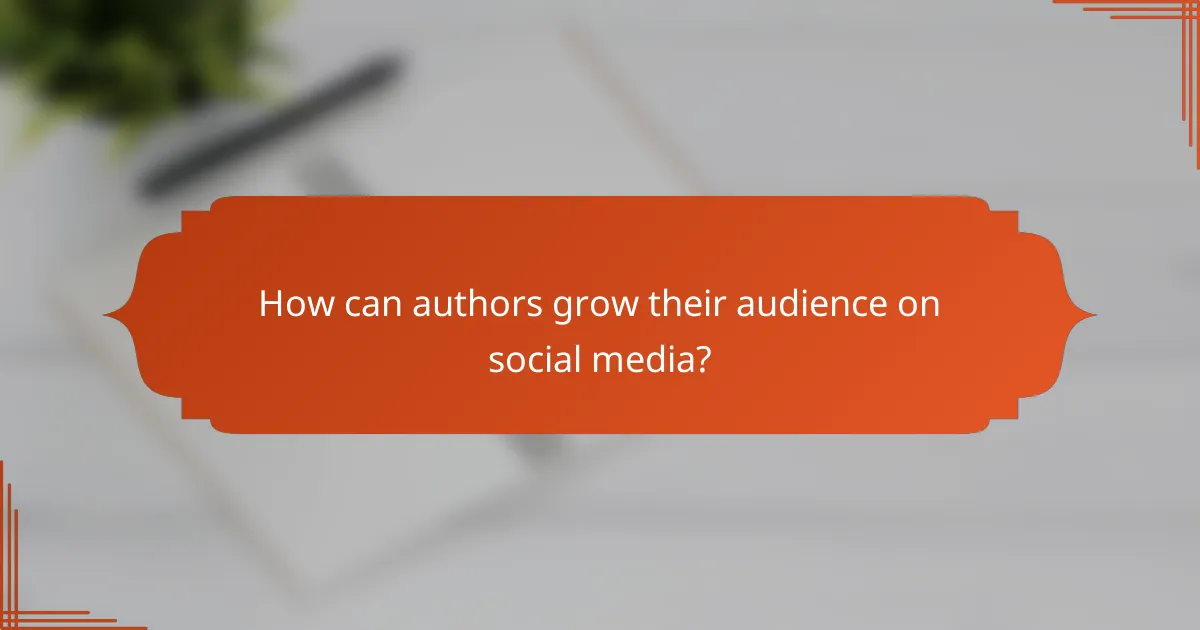
How can authors grow their audience on social media?
Authors can grow their audience on social media by actively engaging with their target readers, sharing valuable content, and utilizing strategic marketing techniques. Building a strong online presence requires consistent effort and a clear understanding of the platforms that best suit their audience.
Leveraging hashtags effectively
Using hashtags allows authors to increase the visibility of their posts and connect with potential readers. Research popular hashtags within your genre and incorporate them into your posts to reach a broader audience.
Aim for a mix of trending and niche hashtags—using around 5 to 10 relevant tags per post can enhance engagement without overwhelming your audience. Monitor which hashtags drive the most interaction to refine your strategy over time.
Collaborating with influencers
Partnering with influencers in your genre can significantly boost your reach and credibility. Identify influencers who align with your brand and have a following that matches your target audience.
Consider offering them a free copy of your book in exchange for a review or a shout-out on their social media platforms. This collaboration can expose your work to their followers, potentially converting them into new readers.
Running targeted ads on Facebook
Facebook ads can be an effective way to reach specific demographics and promote your book. Utilize Facebook’s targeting options to narrow down your audience based on interests, location, and behaviors.
Start with a modest budget, perhaps around $5 to $20 per day, to test different ad creatives and audiences. Monitor the performance of your ads and adjust your strategy based on engagement metrics to maximize your return on investment.
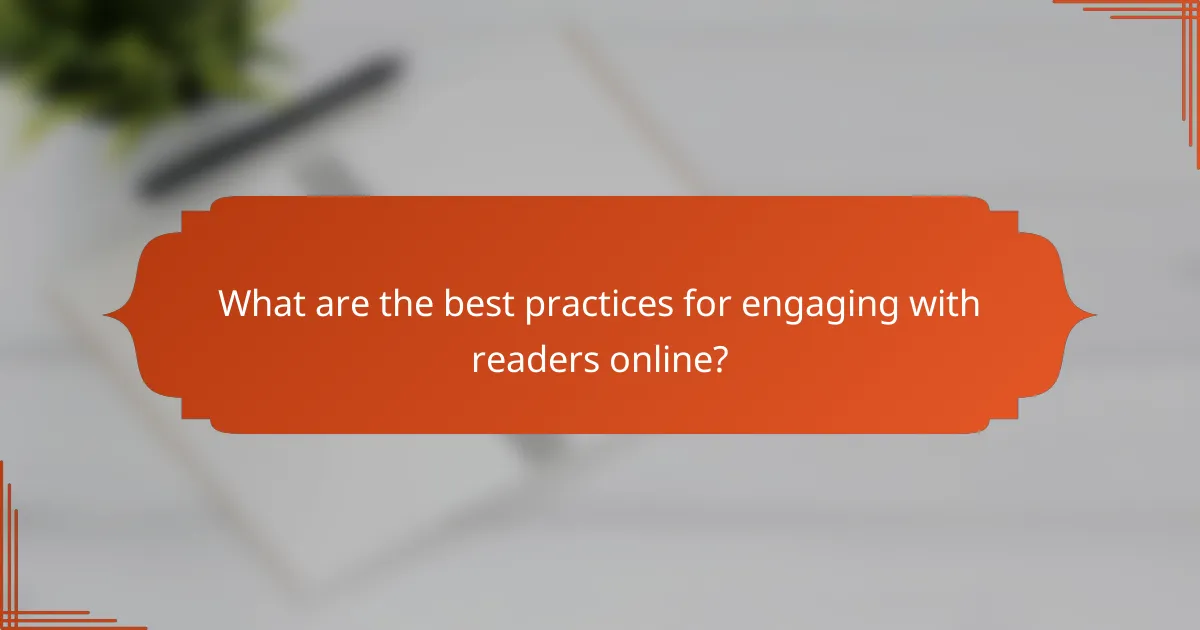
What are the best practices for engaging with readers online?
Engaging with readers online involves actively interacting with them through various digital platforms. Effective practices can enhance reader loyalty and foster a vibrant community around your work.
Responding to comments promptly
Timely responses to reader comments can significantly boost engagement. Aim to reply within a few hours to foster a sense of connection and appreciation among your audience.
Consider setting aside specific times each day to check and respond to comments. This routine helps maintain consistent interaction without overwhelming your schedule.
Hosting live Q&A sessions
Live Q&A sessions allow readers to engage directly with you, creating a dynamic interaction. These sessions can be hosted on platforms like Instagram Live, Facebook Live, or YouTube, and should be scheduled at times when your audience is most active.
Promote these events in advance to maximize attendance. Encourage readers to submit questions beforehand to ensure a smooth flow during the session.
Creating polls and surveys
Polls and surveys are effective tools for gauging reader interests and preferences. Use platforms like Twitter or Instagram Stories to create quick polls, or consider more detailed surveys through Google Forms or SurveyMonkey.
Share the results with your audience to show that their opinions matter. This transparency can enhance trust and encourage further participation in future polls or surveys.
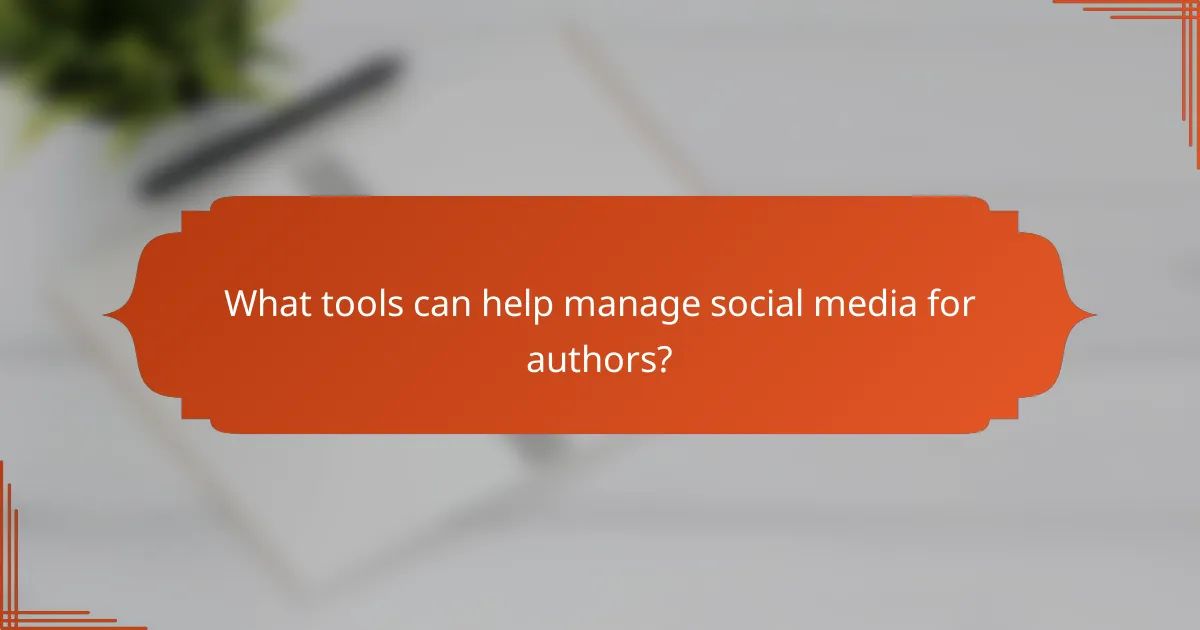
What tools can help manage social media for authors?
Authors can effectively manage their social media presence using various tools designed for scheduling, design, and analytics. These tools streamline tasks, enhance engagement, and provide insights into audience behavior, making it easier to grow and maintain a loyal following.
Using Hootsuite for scheduling
Hootsuite is a powerful tool that allows authors to schedule posts across multiple social media platforms from a single dashboard. By planning content in advance, authors can ensure consistent posting, even during busy writing periods.
To get started, create an account and connect your social media profiles. You can then use the scheduling feature to set specific times for each post, optimizing for when your audience is most active. Regularly review engagement metrics to adjust your posting times as needed.
Canva for graphic design
Canva is an intuitive graphic design tool that enables authors to create visually appealing images for their social media posts. With a wide range of templates tailored for various platforms, authors can easily design promotional graphics, quotes, and cover images.
To maximize effectiveness, use Canva’s features to maintain brand consistency by selecting a color palette and font style that reflects your author identity. Consider creating a library of reusable templates for different types of posts to save time and maintain a cohesive look.
Buffer for analytics tracking
Buffer is an analytics tool that helps authors track the performance of their social media posts. By analyzing engagement metrics such as likes, shares, and comments, authors can gain insights into what content resonates with their audience.
Set up Buffer by connecting your social media accounts and using its analytics dashboard to monitor key performance indicators. Regularly review this data to refine your content strategy, focusing on the types of posts that generate the most engagement and adjusting your approach accordingly.
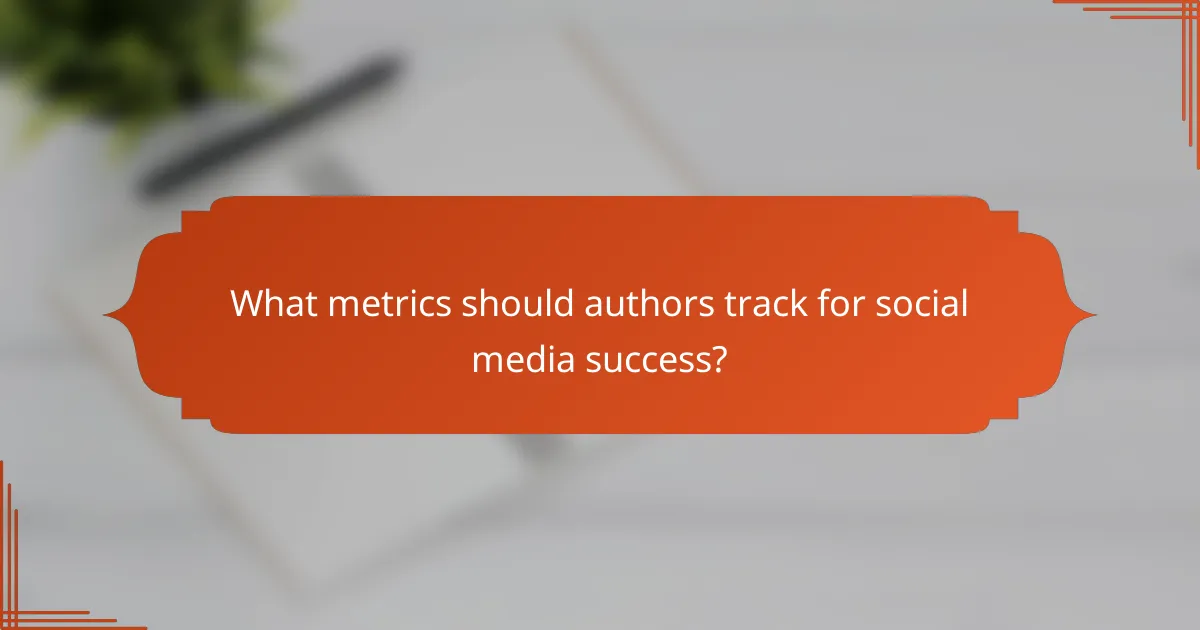
What metrics should authors track for social media success?
Authors should track metrics such as engagement rates and follower growth to gauge their social media success. These metrics provide insights into audience interaction and the effectiveness of content strategies.
Engagement rate analysis
Engagement rate measures how actively your audience interacts with your content. This includes likes, shares, comments, and saves, typically expressed as a percentage of total followers or impressions. A higher engagement rate indicates that your content resonates well with your audience.
To calculate engagement rate, use the formula: (Total Engagements / Total Followers) x 100. Aim for engagement rates in the low to mid-single digits for most platforms, but higher rates can be achieved with targeted content and active community management.
Common pitfalls include focusing solely on follower count rather than engagement. Prioritize meaningful interactions over sheer numbers to build a loyal readership.
Follower growth tracking
Follower growth tracking involves monitoring the increase or decrease in your social media followers over time. This metric helps authors understand the effectiveness of their outreach and promotional strategies. Consistent growth indicates that your content is attracting new readers.
To track follower growth, analyze your follower count weekly or monthly, noting any spikes or drops. A healthy growth rate might range from 5% to 10% monthly, depending on your niche and promotional efforts.
Be cautious of sudden follower spikes, as they may result from temporary trends or bots. Focus on sustainable growth through consistent, quality content and engagement with your audience.
